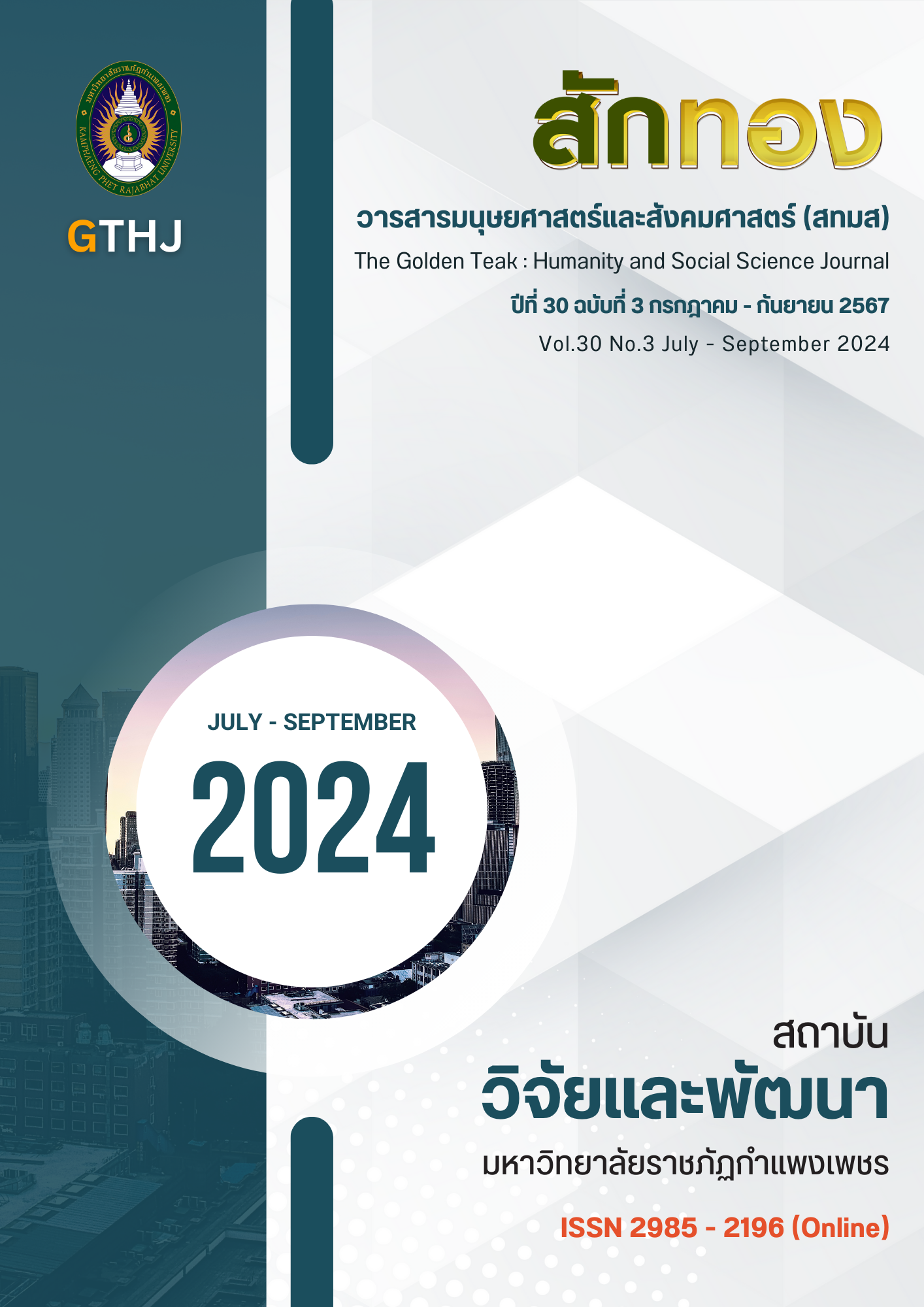The Study of Supervision Status to Promote Competence in Technology-based Learning for Elementary School Teachers
Main Article Content
Abstract
The purposes of this research were to 1) to study the supervision status to promote competence in technology-based learning for elementary school teachers, 2) to study generate the supervision guidelines for those teachers under the jurisdiction of Ubon Ratchathani Elementary Education Area Office 2. The samples consisted of 314 teachers gained by stratified sampling, and 5 supervisors gained by purposive sampling. The research instruments constructed by the research were a questionnaire for the teachers with the reliability of 0.96 and a semi-structured interview form with higher suitability of 5.00 which was in the best level. The statistics for data analysis was percentage, mean, and standard deviation. The research found that: 1) the supervision status in all aspects of the objective setting, the planning, the measurement and evaluation, and implementing was at a higher level with the mean of 4.30, while each aspect also showed a higher level with the means of 4.42 in objective setting, 4.40 in planning, 4.38 in measuring and evaluating, and 4.16 in implementing aspects. The results implied that the supervision status was actively implemented. 2) The supervision guidelines were generated as 4 consecutive steps of planning, objective setting, implementing, and measuring and evaluating. The planning step should be focusing on supervision, the supervisors and supervision recipient to in reflecting needs of learning management, the objective setting should be focusing on supervisors and supervision recipient, the supervision recipient jointly set objectives and organize training sessions to educate the supervision, the implementing should be focusing on supervision plan. Then record the performance for reflection, and the measuring and evaluating should be focusing on jointly reflecting on the results of learning management together to find ways to solve problems change the method of learning management lead to the next step planning.
Article Details

This work is licensed under a Creative Commons Attribution-NonCommercial-NoDerivatives 4.0 International License.
บทความที่ได้รับการตีพิมพ์เป็นลิขสิทธิ์ของวารสาร สักทอง : วารสารมนุษยศาสตร์และสังคมศาสตร์ สถาบันวิจัยและพัฒนา มหาวิทยาลับราชภัฏกำแพงเพชร
ข้อคิดเห็นใดๆ ที่ปรากฎในวารสารเป็นวรรณกรรมของผู้เขียนโดยเฉพาะ ซึ่งมหาวิทยาลัยราชภัฏกำแพงเพชรและบรรณาธิการไม่จำเป็นต้องเห็นด้วย
References
Acheson, K. A. & Gall, M. D. (2003). Clinical supervision and teacher development: Preservice and inservice applications. John Wiley and Sons : USA.
Angraini, E & Zubaidah, S. (2022). Enhancing Creativity in Genetics Using Three Teaching Strategies- Based TPACK Model. EURASIA Journal of Mathematics, Science and Technology Education, 18(12), 2-14.
Castaneda, L. (2023). Beyond Functionality: Building Critical Digital Teaching Competence Among Future Primary Education Teachers. Contemporary Educational Technology, 15(1), 1-17.
Glatthorn, A.A. (1984). Differentiated Supervision. Washington D.C. : Association for Supervision and Curriculum Development.
Gordon, S.P. (2019). Educational Supervision: Reflections on Its Past, Present, and Future. Journal of Educational Supervision, 2(2), 27-52.
Izwah, B.I. (2018). An Important Role of Educational Supervision in the Digital Age. The International Journal of Counseling and Education, 3(4), 115-120.
Jahanian, R. (2023). Principles for Educational Supervision and Guidance. Journal of Sociological Research, 4(2), 115-120.
Laowreandee, W. (2556). Teaching Supervision and Coaching : Professional Development : Theory, Strategies into Practice. (12 th ed.). Bangkok : Silpakorn University Sanam Chandra Palace Campus. [In Thai]
Ministry of Education. (2563). Easy to understand competencies, public version, and understand the basic curriculum Simple competencies for teachers, administrators and educational personnel. Bangkok : Bureau of Academic Affairs and Educational Standards. [In Thai]
Ministry of Education. (2565). Managed learning resources that build hands-on learning skills. Schedule of basic education levels. Bangkok : Bureau of Academic Affairs and Educational Standards. [In Thai]
Chaiwong, N. (2560). Development of a Supervision Model Based on the Blended Learning Concept to Improve Classroom Research Ability of Teachers under the Office of Nakhon Phanom Primary Education Service Area 1. Ph.D. Research of Curriculum and Instruction Sakon Nakhon Rajabhat University. [In Thai]
Office of the Basic Education Commission. (2564). Announcement of the policy and focus of the Office of the Basic Education Commission Fiscal Year 2023 (28 December 2021). Bangkok : Office of the Basic Education Commission. [In Thai]
Office of the National Economic and Social Development Council. (2562). National Strategy 2018-2037. (2 nd ed.). Bangkok : Office of the National Economic and Social Development Board. [In Thai]
Phonrawatjaradwat, S. (2564). Educational Supervision in the Situation of the COVID-19 Epidemic : A Case Study on A Using SM3 supervisory process. Journal of the Royal Thai Naval Academy in Social Sciences, Humanities and Education, 8(1) 31-42. [In
Thai]
Scherer, R. (2017). On the Quest for Validity: Testing the Factor Structure and Measurement Invariance of the Technology-Dimensions in the Technological, Pedagogical, and Content Knowledge (TPACK) model. Belgium : Interfaculty Department for Teacher Education, Vrije Universiteit Brussel.
Suchyadia, Y. (2019). Increasing Personality Competence of Primary School Teachers, Through Education Supervision Activities in Bogor City. Journal of community engagement, 1(1), 20-23.
Thipatdee, G. (2560). Curriculum development practice and teaching. Ubon Ratchathani : Ubon Ratchathani Rajabhat University. [In Thai]
Utranan, S. (2530). Educational supervision, principles, theory and practice. (2 nd ed.). Bangkok : Mitsiam Printing House. [In Thai]
Vanichbuncha, K. (2018). Statistics for Research. (12 th ed.). Bangkok : Samlada. [In Thai]


